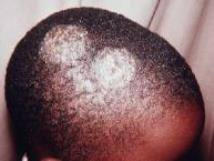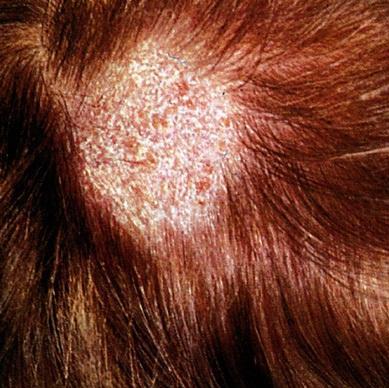
If you have ringworm on your scalp, you might be worried about losing your hair. Not everyone with ringworm of the scalp, technically known as tinea capitis, experiences hair loss, but some people do. We’ll tell you how ringworm can cause hair loss and how ringworm of the scalp is treated. Prompt treatment is the best way to prevent hair loss due to ringworm; the worse a case of ringworm becomes, the more likely you are to lose hair. In severe cases, hair loss can be permanent.
What Causes Ringworm Hair Loss?
Ringworm is a fungal infection. It’s not really caused by a worm. It just gets its name from its ring-like appearance. When you have ringworm of the scalp, however, you may not see the characteristic ring-like shapes. What you probably will see are round patches of scaly skin with the hair broken off at or near the scalp. You may also have areas in which hair seems very brittle or comes out easily. Your scalp may feel tender or sore.
Hair usually breaks off or falls out in the areas affected by scalp ringworm, but it usually grows back after the infection has been treated and has all cleared up. In some cases, though, ringworm hair loss is permanent. That’s usually the result of a condition called kerion.
What is Kerion?

Kerion is a severe inflammation that can result from ringworm of the scalp. Areas on the scalp become swollen and pus drains from them. The scalp also develops a thick yellow crust. The condition is painful and results in hair loss. Scarring often occurs as a result of the severe inflammation and in the areas where scars develop, the hair will not grow back. If you think you’ve developed a kerion, you need to see a doctor as soon as possible for treatment.
Preventing Ringworm Hair Loss
The best way to prevent ringworm-related hair loss, of course, is to avoid getting ringworm in the first place. There are some steps you can take to protect yourself.
- Avoid close physical contact with people that have ringworm. Of course, you may not always know when someone has the condition, but avoid close contact with those that do if you can.
- If you have a pet with any sort of scaly rash, take your pet to the vet as soon as possible and avoid handling your pet as much as you can until you’ve been to the vet and gotten a diagnosis and treatment. You can get ringworm from cats, dogs, rabbits, ferrets, and other domestic animals.
- Avoid sharing personal items like hats, shoes, hairbrushes, and towels with other people.
- Wear flip flops or shower shoes in locker rooms, public showers, at the pool, and at the beach. This protects you from ringworm of the feet, often referred to as athlete’s foot, which can spread to other areas of your body.
If you do end up getting ringworm, you can help prevent hair loss by getting treatment for your condition right away. If you have ringworm somewhere on your body, get treatment before it has a chance to spread to your scalp. If you have ringworm on the scalp, get treatment before the condition worsens and causes scarring, which leads to permanent hair loss.
Our Favorite Fast-Working Treatment For Ringworm
Ringworm is usually treated with over-the-counter medications, although occasionally prescription medications are required for severe cases. Our favorite over-the-counter treatment for ringworm is Phytozine. One reason we like it is that it works fast. Fast-working treatment is important if you want to prevent hair loss. Of course, we also like it because it’s very effective. In addition to clearing up ringworm, it contains a number of natural ingredients like lavender oil, tea tree oil, and aloe that work together to soothe scaly skin and stop itching and irritation. To learn more and see if Phytozine is right for you, just follow the links.
